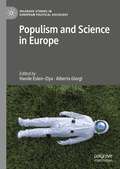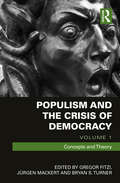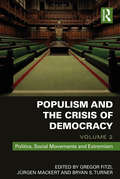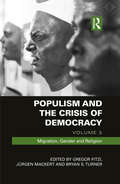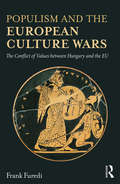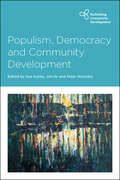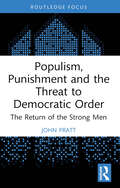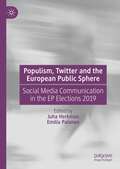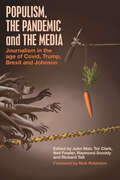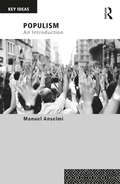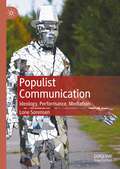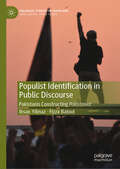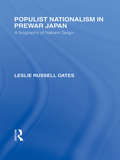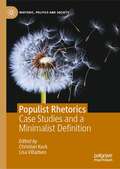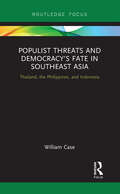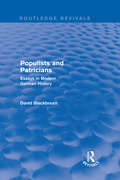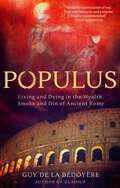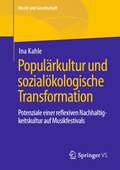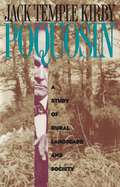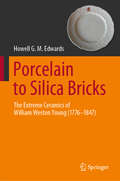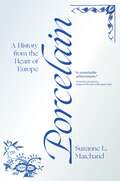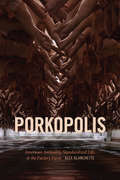- Table View
- List View
Populism and Science in Europe (Palgrave Studies in European Political Sociology)
by Hande Eslen-Ziya Alberta GiorgiThis book provides the first systematic and comparative analysis of the intersections of populism and science in Europe, from the perspective of political sociology.Populism is the object of rich scholarly debate over its definition and the best way to approach its study. But until now, little attention has been paid to the relationships between populism and science. Recently, the Covid-19 crisis has exposed the contradictions in this relationship, and this book combines an analysis of the theoretical aspects of the relationship between populism and science with rigorous empirical research.The theoretical perspectives show populism as a thin-ideology, as discourse and performance, and as a political logic, consider both right-wing and left-wing populism, and focus on leaders as well as citizens. The book also offers an overview of controversies within different fields of ‘science’, including case studies on food science, climate change, vaccination, gender theory, COVID-19, and environmental issues.The book will be of interest to scholars and students of a number of social science disciplines, including political sociology, political science and political psychology.
Populism and the Crisis of Democracy: Volume 1: Concepts and Theory (Routledge Advances in Sociology)
by Bryan S. Turner Juergen Mackert Gregor FitziThere is no threat to Western democracies today comparable to the rise of right-wing populism. While it has played an increasing role at least since the 1990s, only the social consequences of the global financial crises in 2008 have given it its break that led to UK’s ‘Brexit’ and the election of Donald Trump as US President in 2016, as well as promoting what has been called left populism in countries that were hit the hardest by both the banking crisis and consequential neo-liberal austerity politics in the EU, such as Greece and Portugal. In 2017, the French Front National (FN) attracted many voters in the French Presidential elections; we have seen the radicalization of the Alternative für Deutschland (AfD) in Germany and the formation of centre-right government in Austria. Further, we have witnessed the consolidation of autocratic regimes, as in the EU member states Poland and Greece. All these manifestations of right-wing populism share a common feature: they attack or even compromise the core elements of democratic societies such as the separation of powers, protection of minorities, or the rule of law. Despite a broad debate on the re-emergence of ‘populism’ in the transition from the twentieth to the twenty-first century that has brought forth many interesting findings, a lack of sociological reasoning cannot be denied, as sociology itself withdrew from theorising populism decades ago and largely left the field to political sciences and history. In a sense, Populism and the Crisis of Democracy considers itself a contribution to begin filling this lacuna. Written in a direct and clear style, this set of volumes will be an invaluable reference for students and scholars in the field of political theory, political sociology and European Studies. This volume Concepts and Theory offers new and fresh perspectives on the debate on populism. Starting from complaints about the problems of conceptualising populism that in recent years have begun to revolve around themselves, the chapters offer a fundamental critique of the term and concept of populism, theoretically inspired typologies and descriptions of currently dominant concepts, and ways to elaborate on them. With regard to theory, the volume offers approaches that exceed the disciplinary horizon of political science that so far has dominated the debate. As sociological theory so far has been more or less absent in the debate on populism, only few efforts have been made to discuss populism more intensely within different theoretical contexts in order to explain its dynamics and processes. Thus, this volume offers critical views on the debate on populism from the perspectives of political economy and the analysis of critical historical events, the links of analyses of populism with social movement mobilisation, the significance of ‘superfluous populations’ in the rise of populism and an analysis of the exclusionary character of populism from the perspective of the theory of social closure.
Populism and the Crisis of Democracy: Volume 2: Politics, Social Movements and Extremism
by Bryan S. Turner Juergen Mackert Gregor FitziThe contributions to this volume Politics, Social Movements and Extremism take serious the fact that populism is a symptom of the crisis of representation that is affecting parliamentary democracy. Right-wing populism skyrocketed to electoral success and is now part of the government in several European countries, but it also shaped the Brexit campaign and the US presidential election. In Southern Europe, left-wing populism transformed the classical two parties systems into ungovernable three fractions parliaments, whereas in Latin America it still presents an instable alternative to liberal democracy. The varying consequences of populist mobilisation so far consist in the maceration of the established borders of political culture, the distortion of legislation concerning migrants and migration, and the emergence of hybrid regimes bordering on and sometimes leaning towards dictatorship. Yet, in order to understand populism, innovative research approaches are required that need to be capable of overcoming stereotypes and conceptual dichotomies which are deeply rooted in the political debate. The chapters of this volume offer such new theoretical strategies for inquiring into the multi-faceted populist phenomenon. The chapters analyse its language, concepts and its relationship to social media in an innovative way, draw the con - tours of left- and right-wing populism and reconstruct its shifting delimitation to political extremism. Furthermore, they value the most significant aftermath of populist mobilisation on the institutional frame of parliamentary democracy from the limitation of the freedom of press, to the dismantling of the separation of powers, to the erosion of citizenship rights. This volume will be an invaluable reference for students and scholars in the field of political theory, political sociology and European Studies.
Populism and the Crisis of Democracy: Volume 3: Migration, Gender and Religion (Routledge Advances In Sociology Ser.)
by Bryan S. Turner Juergen Mackert Gregor FitziThe contributions to this volume Migration, Gender and Religion bring together empirically grounded and theoretically sophisticated case studies of populist responses to what are perceived to be the threats to national survival and sovereignty from ‘uncontrolled’ immigration. The demographic context – declining fertility rates and ageing populations – promotes the belief that high Muslim fertility rates are material evidence of an Islamic threat to the West, to national cohesion and particularly to the safety and dignity of the women of the host community. Consequently, gender plays an important part in populist ideology, but populist attitudes to gender are often contradictory. Populist movements are often marked by misogyny and by policies that are typically anti-feminist in rejecting gender equality. The traditional family with a dominant father and submissive mother is promoted as the basis of national values and the remedy against social decline. The obsession with women in the public domain points to a crisis of masculinity associated with unemployment, the impact of austerity packages on social status, and the growth of pink collar employment. Inevitably, religion is drawn into these political debates about the future of Western societies, because religion in general has seen the family and mothers as essential for the reproduction of religion. Christendom has been identified by populists as providing the ultimate defence of the borders of European civilisation against Islam, despite the fact that church leaders have often defended and welcomed outsiders in terms of Christian charity. Once more Christian Europe is the Abendland standing in defiance of a threatening and subversive Morgenland. This volume will be an invaluable reference for students and scholars in the field of political theory, political sociology and European Studies.
Populism and the European Culture Wars: The Conflict of Values between Hungary and the EU
by Frank FurediConcern and hostility towards populism has become a distinctive feature of contemporary political culture. In Europe such concerns are frequently directed at Eurosceptics, whose opposition to the European Union is often portrayed as a cultural crime. Ancient anti-democratic claims about the gullibility, ignorance and irrationality of the masses are frequently recycled through the anti-populist condemnation of people who vote the wrong way. This book argues that the current outburst of anti-populist anxiety is symptomatic of a loss of faith in democracy and in the ability of the demos to assume the role of responsible citizens. Distrust of the people and of parliamentary sovereignty is reinforced by the concern that, on its own, liberal democracy lacks the normative foundation to inspire the loyalty and affection of ordinary citizens. Through focusing on the conflict between the European Union’s Commission and the Government of Hungary, this book explores contrasting attitudes towards national sovereignty, popular sovereignty and the question of tradition and the past as the main drivers of the culture war in Europe.
Populism, Democracy and Community Development (Rethinking Community Development)
by Sue Kenny, Jim Ife and Peter WestobyUsing international perspectives and case studies, this book discusses the relationships between community development and populism in the context of today’s widespread crisis of democracy. It investigates the development, meanings and manifestations of contemporary forms of populism and explores the synergies and contradictions between the values and practices of populism and community development. Contributors examine the ways that the ascendancy of right-wing populist politics is influencing the landscapes within which community development is located and they offer new insights on how the field can understand and respond to the challenges of populism.
Populism, Punishment and the Threat to Democratic Order: The Return of the Strong Men (Routledge Studies in Crime and Society)
by John PrattThis book traces the rise of contemporary populism in Western democracies, marked by the return of would-be 'strong men' politicians. It seeks to make sense of the resultant nature, origins, and consequences —as expressed, for example, in the startling rise of the social movement surrounding Trump in the US, Brexit in the UK and the remarkable spread of ideologies that express resistance to "facts," science, and expertise. Uniquely, the book shows how what began as a form of penal populism in the early 1990s transformed into a more wide ranging populist politics with the potential to undermine or even overthrow the democratic order altogether; examines the way in which the Covid-19 pandemic has impacted on these forces, arguing it threw the flailing democratic order an important lifeline, as Vladimir Putin has subsequently done with his war in Ukraine. The book argues that contemporary political populism can be seen as a wider manifestation of the earlier tropes and appeal of penal populism arising under neo-liberalism. The author traces this cross over and the roots of discontent, anxiety, anti-elites sentiment and the sense of being forgotten, that lie at the heart of populism, along with its effects in terms of climate denial, ‘fake news’, othering, nativism and the denigration of scientific and other forms of expertise. In a highly topical and important extension to the field the author suggests that the current covid pandemic might prove to be an ‘antidote’ to populism, providing the conditions in which scientific and medical expertise, truth telling, government intervention in the economy and in health policy, and social solidarity, are revalorised. Encompassing numerous subject areas and crossing many conventional disciplinary boundaries, this book will be of great interest to students and scholars of criminology and criminal justice, sociology, political science, law, and public policy.
Populism, Twitter and the European Public Sphere: Social Media Communication in the EP Elections 2019
by Juha Herkman Emilia PalonenThis volume approaches the relationship between European public sphere and political communication in the framework of establishing populism and social media. The empirical analysis focuses on the comparison between different EU countries during the 2019 EP elections campaign. The data for the analysis was collected real time from Twitter in the Netherlands, Germany, Finland, Italy, Spain, Ireland and the UK. during a month period and are analyzed with both computerized quantitative and manual qualitative methods.The book introduces a new perspective in conceptualizing populism in comparative analysis, in which populism is understood rather as an antagonist logic of political identity formation than pre-defined political ideologies, movements or party cleavages. We approach implications of populist construction of ‘us’ and ‘not us’ in national contexts of 2019 EP election campaigns to find out the relationality between different political actors and parties. A special attention is paid to national/transnational and European/Eurosceptic tendencies in campaign rhetoric. By using a unique idea of ‘hashtag publics’ we approach the common Twitter discussions around the elections and ask: what particular topics and themes did different political actors distribute over Twitter during the 2019 EP elections, how were various topics and actors linked to each other, and how were campaign agendas and actors linked to populism?Chapter-No.1,Chapter-No.4 and Chapter-No. 8 are available open access under a Creative Commons Attribution 4.0 International License via link.springer.com.
Populism, the Pandemic and the Media: Journalism in the age of Covid, Trump, Brexit and Johnson
by John MairPopulism is on the rise across the globe. Authoritarian populist leaders have taken over and solidified their control over many countries. Their power has been cemented during the global coronavirus pandemic, though perhaps the defeat of populist-in-chief Donald Trump in the 2020 US presidential election (despite his continuing protestations to the contrary) has seen the start of the waning of this phenomenon? In the UK Brexit is 'done'; Britain is firmly out of the EU; Covid is vaccinated against; and Boris Johnson has a huge parliamentary majority and, despite never-ending problems, of his own and others' making, his grip on power with a parliamentary majority of more than 80, still seems secure. Meanwhile culture wars continue to rage. How has media, worldwide, contributed, fulled or fought this populism. Cheerleaders? Critics? Supplicants? This book examines those questions in 360 degrees with a distinguished cast of authors from journalism and academia.
Populism: An Introduction (Key Ideas)
by Manuel AnselmiPopulism: An Introduction is the first introduction to the theme of populism. It will introduce the principal theories, definitions, models and contemporary debates. A number of global case studies will be used to illustrate the concept: • Russian populism; • Latin American populism; • Italian populism; • Peronism; • Media populism; • Penal populism; • Constitutional populism. Populism will reflect on the sociology of democratic processes and investigate the evolution of political consensus in contemporary political systems. This book will appeal to academics and postgraduate students working in the field of sociology, political sociology and politics.
Populist Communication: Ideology, Performance, Mediation
by Lone SorensenHow can we make sense of the current age of global political disruption when populism leaves norms overturned and the future form of democracy unpredictable?Political representatives are no longer elected for their experience and expertise but out of a desire for an ephemeral sense of authenticity, a direct connection to citizens, and the certainty of the truths they tell. But when populists project these ideas and claim to represent the citizenry, what is reality and what is strategic performance for the media? This conceptually rich book explores the performative strategies of the populist politicians who disrupt the normative order with acts of ‘truth-telling’. It disentangles their complex use of media—from their appeal to news values through spectacular disruptions to sophisticated social media commentary—in repertoires of mediated performances. Based on vigorous empirical research in both established and transitional democracies, it develops a theoretical framework of populist communication in the new media environment.
Populist Identification in Public Discourse: Pakistanis Constructing Pakistaniat (Palgrave Studies in Populisms)
by Ihsan Yilmaz Fizza BatoolBased on semi-structured interviews with ordinary citizens in Pakistan, this book analyses the complex relationship between populism, political identity, and historical experiences in Pakistan, highlighting how populist discourse influences and is influenced by varied interpretations of Pakistaniat - the identification with Pakistan. It introduces a novel theoretical framework for analysing populism in the public sphere, using Laclau's view of populism as a discursive logic and Panizza's definition as a mode of identification. This connection allows for a deeper understanding of how populist constructs form a collective identity amidst diverse demands, particularly through the concept of "the people" as an empty signifier. The book also examines the multiple meanings associated with Pakistani identity and their ties to the rise of populism, addressing gaps in existing literature regarding the demand side of populism and its impact on both politicians and the public.
Populist Moments and Extractivist States in Venezuela and Ecuador: The People’s Oil?
by Donald Kingsbury Teresa KramarzThis book addresses the intersection of extractivism, populism, and accountability. Although populist politics are often portrayed as a driver of poor environmental governance, Populist Moments and Extractivist States identifies it as an intervening variable at best – one that emerges in response to the accountability deficits of extractive states. Case studies in Venezuela – for many, the prototypical petrostate – and Ecuador – which exchanged agribusiness dependency for oil decades later – illustrate how extractive states are oriented by a colonial logic of export and service. This logic regulates state-society-nature relationships and circumscribes avenues for local stakeholders to hold public officials and extractive industries to account for environmental and human harms. Populist moments of the early 21st century across Latin America responded to these conditions, promising more equitable and sustainable futures. However, rather than reversing the technocracy, verticalism, and exclusion of the recent past, populist moments often intensified and legitimated them in the drive to maximize and distribute resource rents. The result has been cyclical, as populist moments of hope and rupture fall prey to the extractivist states they tried, and failed, to replace.
Populist Nationalism in Pre-War Japan: A Biography of Nakano Seigo (Routledge Library Editions: Japan)
by Leslie R OatesNakano has received very little attention in works in English on the relevant period, as his approaches to effective power were limited while his career also lacks the violent drama associated with movements resorting to terrorism. Even in Japan he has not been made the subject of much academic enquiry. Though remaining a fairly well-known figure he is more generally consigned to the class of ‘ultra-nationalists’ who are blamed for the disaster of Japan’s defeat. This book uses material from the few biographies available in conjunction with some short sketches of Nakano by others, biographies of associates and official publications covering his and related political activities. Primary sources include a representative range of Nakano’s own writings, as well as speeches in the Diet. Interviews with Nakano’s two surviving sons and other close associates also feature.
Populist Rhetorics: Case Studies and a Minimalist Definition (Rhetoric, Politics and Society)
by Christian Kock Lisa VilladsenThis book proposes a unified approach to populism that sees it as a primarily rhetorical concept. Populism is on the rise worldwide with both populist leaders and movements gaining power, and the term “populism” resounds in political debate, journalism, and scholarship. Populism as a phenomenon seems to instantiate perennial issues besetting rhetoric (e.g., the charges of manipulation, exclusive reliance on opinion over knowledge, and abuse of emotional appeals), yet relatively little research on populism has emerged from the discipline of rhetoric. This volume investigates the theory and practice of populism under the heading of rhetoric but as an interdisciplinary effort involving scholars in rhetoric as well as neighbouring disciplines such as political science and sociology. Seven case studies covering Germany, Greece, Hungary, Italy, UK, USA, and Venezuela offer conceptual discussions as well as close analyses applying both historical and theoretical approaches. In the introduction, the editors outline the problem of populism and their project, presenting the book’s wide-spanning case-based explorations. In an afterword they seek to distil a “minimal” rhetorical definition of populism. The claim or pretense to speak for “the people” emerges as the feature that connects the highly diverse instances studied in the book—and populisms in general, the editors hypothesize. They argue that this prevalent rhetorical move, often glossed over as unremarkable and banal, is in principle more debatable and deserving of more vigilant scrutiny than usually assumed.
Populist Threats and Democracy’s Fate in Southeast Asia: Thailand, the Philippines, and Indonesia (Routledge Contemporary Asia Series)
by William CaseDemocracy in Southeast Asia has been explained using a number of factors including historical legacies, social structures, developmental levels, transitional processes, and institutional designs while other elements, such as elite-level relations and social coalitions, have been overlooked. This book offers a new explanation for democracy’s collapse or persistence in Southeast Asia today. Focusing on Thailand, the Philippines and Indonesia — the three countries in the region with the most democratic experience — William Case shows that existing accounts based on contextual factors are by themselves incomplete. Hence, they lead us wrongly to anticipate democracy’s persistence in Thailand and its collapse in Indonesia. They more accurately, though only partially, correlate with democracy’s fluctuations in the Philippines. Advancing a new argument, Case shows that democracy’s fate is determined instead by the opportunities that contextual factors can provide for populist mobilization. His model enables us better to understand democracy’s breakdown in Thailand, its survival in Indonesia, and its slippage in the Philippines. Presenting research into vital questions over democratic durability and authoritarian backlash, this book will be of interest to scholars in the field of comparative politics, specifically comparative democratization and Southeast Asian politics.
Populists and Patricians: Essays in Modern German History (Routledge Revivals)
by David BlackbournFirst published in 1987, this collection of essays, from one of the leading historians in the field, is concerned with the central debates about German history from Bismarck to Hitler. David Blackbourn questions many previously held assumptions, whether about the natural conservatism of the German peasantry of the ‘feudalization’ of the middle classes, and offers an innovative approach to such subjects as liberalism, anti-semitism and the continuing importance of religion in German history. Bringing together social, economic, cultural and political history, each essay is concerned with the social and political flux that characterized the period, and with the problems and opportunities it presented. This reissue will be of great value to any students and academics with an interest in the history of modern Germany.
Populus: Living and Dying in the Wealth, Smoke and Din of Ancient Rome
by Guy de BédoyèreA Time Travellers Guide to Ancient Rome - by one of the best historians of the ancient worldLiving in ancient Rome was superbly and vividly recorded by Rome's historians, philosophers, and poets who were acutely aware of the seething and voluptuous nature of a city that ruled the known world. Through the words of Tacitus, Seneca, Martial, and a host of others including ordinary Romans, Guy de la Bédoyère takes the reader into a world of violent politics, civil disorder, unspeakably brutal entertainments, extravagance, decadence, eroticism, exotica, and staggering inequality, participated in daily by the Roman people from the hyper-rich elite to the lowliest slaves. Populus places those who experienced Rome in person at the forefront of their story, from the rabble-rousing senator Clodius Pulcher to Pliny the Elder and Hortensia who defended the rights of women in court to the ex-slave and celebrity baker Eurysaces.'A superb combination of wit, first-rate research and panache. Highly recommended!' TONY ROBINSON'A rollicking new book... de la Bédoyère's command of these disparate sources is masterful, and his curation of them forms the backbone of the book' HONOR CARGILL-MARTIN, SUNDAY TELEGRAPH
Populus: Living and Dying in the Wealth, Smoke and Din of Ancient Rome
by Guy de BédoyèreA Time Travellers Guide to Ancient Rome - by one of the best historians of the ancient worldLiving in ancient Rome was superbly and vividly recorded by Rome's historians, philosophers, and poets who were acutely aware of the seething and voluptuous nature of a city that ruled the known world. Through the words of Tacitus, Seneca, Martial, and a host of others including ordinary Romans, Guy de la Bédoyère takes the reader into a world of violent politics, civil disorder, unspeakably brutal entertainments, extravagance, decadence, eroticism, exotica, and staggering inequality, participated in daily by the Roman people from the hyper-rich elite to the lowliest slaves. Populus places those who experienced Rome in person at the forefront of their story, from the rabble-rousing senator Clodius Pulcher to Pliny the Elder and Hortensia who defended the rights of women in court to the ex-slave and celebrity baker Eurysaces.'A superb combination of wit, first-rate research and panache. Highly recommended!' TONY ROBINSON'A rollicking new book... de la Bédoyère's command of these disparate sources is masterful, and his curation of them forms the backbone of the book' HONOR CARGILL-MARTIN, SUNDAY TELEGRAPH
Populärkultur und sozialökologische Transformation: Potenziale einer reflexiven Nachhaltigkeitskultur auf Musikfestivals (Musik und Gesellschaft)
by Ina KahleMusikfestivals gelten in der Regel nicht als Orte gelebter ökologischer Nachhaltigkeit. Ein anscheinend unbedachter Umgang mit benötigten Ressourcen sowie der oftmals unverhältnismäßige Konsum von Alkohol sprechen zunächst nicht dafür, dass gerade hier eine Chance für einen im nachhaltigen Sinne erforderlichen Wertewandel der Gesellschaft liegt.Dieses Buch widmet sich einem in diesem Kontext bisher weitgehend unbeachteten Aspekt von Musikfestivals: In einer umfangreichen empirischen Studie werden auf verschiedenen Musikfestivals beobachtete drastische Veränderungen von Verhaltensmustern der Besucher und die Gründe hierfür untersucht. Unter den Festivalgästen wird ein habitueller Grundmodus ausgemacht, der sich relevant von dem in deren Alltag unterscheidet. Es wird der Frage nachgegangen, welches Potenzial für die sozialökologische Transformation von Gesellschaften der Beibehaltung dieses Grundmodus über die Grenzen der Festivals hinaus innewohnt.
Poquosin
by Jack Temple KirbyJack Temple Kirby charts the history of the low country between the James River in Virginia and Albemarle Sound in North Carolina. The Algonquian word for this country, which means 'swamp-on-a-hill,' was transliterated as 'poquosin' by seventeenth-century English settlers. Interweaving social, political, economic, and military history with the story of the landscape, Kirby shows how Native American, African, and European peoples have adapted to and modified this Tidewater area in the nearly four hundred years since the arrival of Europeans. Kirby argues that European settlement created a lasting division of the region into two distinct zones often in conflict with each other: the cosmopolitan coastal area, open to markets, wealth, and power because of its proximity to navigable rivers and sounds, and a more isolated hinterland, whose people and their way of life were gradually--and grudgingly--subjugated by railroads, canals, and war. Kirby's wide-ranging analysis of the evolving interaction between humans and the landscape offers a unique perspective on familiar historical subjects, including slavery, Nat Turner's rebellion, the Civil War, agricultural modernization, and urbanization.
Porcelain Analysis and Its Role in the Forensic Attribution of Ceramic Specimens (Cultural Heritage Science)
by Howell G. EdwardsThe material for this book arose from the author’s research into porcelains over many years, as a collector in appreciation of their artistic beauty , as an analytical chemist in the scientific interrogation of their body paste, enamel pigments and glaze compositions, and as a ceramic historian in the assessment of their manufactory foundations and their correlation with available documentation relating to their recipes and formulations. A discussion of the role of analysis in the framework of a holistic assessment of artworks and specifically the composition of porcelain, namely hard paste, soft paste, phosphatic, bone china and magnesian, is followed by its growth from its beginnings in China to its importation into Europe in the 16th Century. A survey of European porcelain manufactories in the 17th and 18th Centuries is followed by a description of the raw materials, minerals and recipes for porcelain manufacture and details of the chemistry of the high temperature firing processes involved therein. The historical backgrounds to several important European factories are considered, highlighting the imperfections in the written record that have been perpetuated through the ages. The analytical chemical information derived from the interrogation of specimens, from fragments, shards or perfect finished items, is reviewed and operational protocols established for the identification of a factory output from the data presented. Several case studies are examined in detail across several porcelain manufactories to indicate the role adopted by modern analytical science, with information provided at the quantitative elemental oxide and qualitative molecular spectroscopic levels, where applicable. The attribution of a specimen to a particular factory is either supported thereby or in some cases a potential reassessment of an earlier attribution is indicated. Overall, the information provided by analytical chemical data is seen to be extremely useful for porcelain identification and for its potential attribution in the context of a holistic forensic evaluation of hitherto unknown porcelain exemplars of questionable factory origins.
Porcelain to Silica Bricks: The Extreme Ceramics of William Weston Young (1776-1847)
by Howell G.M. EdwardsThe title of this book describes the two extremes of ceramic invention from aesthetically beautiful and decorative works of art that graced the tables of the aristocracy to the functional silica brick that lined the smelting furnaces of industrialised nations in the 19th century designed to produce iron, copper and glass. Both of these ceramics are linked to one man, William Weston Young (1776-1847) and with his contemporaries both of these ceramic extremes became world leaders in their own right. The book traces the history of Young and his ambitions, his interactions with numerous associates and the influence these ceramics attained in 19th century society. The book provides a sequel to the two preceding texts on Nantgarw and Swansea porcelains (also published by Springer), which cover one extreme and extends the discourse onto the other extreme, which until now has been relatively ignored despite its scientific and engineering importance. The trilogy has now therefore been completed. This book examines the historical documentation along with scientific analytical data from the last 100 years up to the present in a novel holistic forensic approach.It will be of interest to porcelain collectors, ceramics analysts, museum ceramic curators, ceramic historians, analytical scientists, cultural heritage preservation, industrial archaeologists and industrial museums.
Porcelain: A History from the Heart of Europe
by Suzanne L. Marchand"This is the book on porcelain we have been waiting for. . . . A remarkable achievement."—Edmund de Waal, author of The Hare with Amber EyesA sweeping cultural and economic history of porcelain, from the eighteenth century to the presentPorcelain was invented in medieval China—but its secret recipe was first reproduced in Europe by an alchemist in the employ of the Saxon king Augustus the Strong. Saxony’s revered Meissen factory could not keep porcelain’s ingredients secret for long, however, and scores of Holy Roman princes quickly founded their own mercantile manufactories, soon to be rivaled by private entrepreneurs, eager to make not art but profits. As porcelain’s uses multiplied and its price plummeted, it lost much of its identity as aristocratic ornament, instead taking on a vast number of banal, yet even more culturally significant, roles. By the nineteenth and twentieth centuries, it became essential to bourgeois dining, and also acquired new functions in insulator tubes, shell casings, and teeth.Weaving together the experiences of entrepreneurs and artisans, state bureaucrats and female consumers, chemists and peddlers, Porcelain traces the remarkable story of “white gold” from its origins as a princely luxury item to its fate in Germany’s cataclysmic twentieth century. For three hundred years, porcelain firms have come and gone, but the industry itself, at least until very recently, has endured. After Augustus, porcelain became a quintessentially German commodity, integral to provincial pride, artisanal industrial production, and a familial sense of home.Telling the story of porcelain’s transformation from coveted luxury to household necessity and flea market staple, Porcelain offers a fascinating alternative history of art, business, taste, and consumption in Central Europe.
Porkopolis: American Animality, Standardized Life, and the Factory Farm
by Alex BlanchetteIn the 1990s a small midwestern American town approved the construction of a massive pork complex, where almost 7 million hogs are birthed, raised, and killed every year. In Porkopolis Alex Blanchette explores how this rural community has been reorganized around the life and death cycles of corporate pigs. Drawing on over two years of ethnographic fieldwork, Blanchette immerses readers into the workplaces that underlie modern meat, from slaughterhouses and corporate offices to artificial insemination barns and bone-rendering facilities. He outlines the deep human-hog relationships and intimacies that emerge through intensified industrialization, showing how even the most mundane human action, such as a wayward touch, could have serious physical consequences for animals. Corporations' pursuit of a perfectly uniform, standardized pig—one that can yield materials for over 1000 products—creates social and environmental instabilities that transform human lives and livelihoods. Throughout Porkopolis, which includes dozens of images by award-winning photographer Sean Sprague, Blanchette uses factory farming to rethink the fraught state of industrial capitalism in the United States today.
